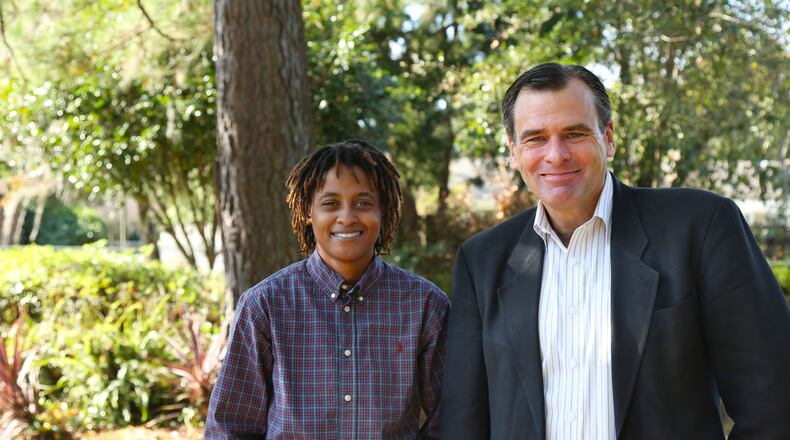Federal law does not prohibit employers from discriminating against workers because they are lesbian or gay, an Atlanta appeals court has ruled.
The 11th U.S. Circuit Court of Appeals, in a 2-1 ruling issued Friday, denied the LGBT community what could have been a landmark court victory. Instead, the court declined to expand workplace protections to gays and lesbians under Title VII of the Civil Rights Act of 1964, which already prohibits discrimination on the basis of race, sex, religion and national origin.
The decision sparked pointed exchanges between dissenting Judge Robin Rosenbaum, an appointee of President Barack Obama, and Judge Bill Pryor, the former Alabama attorney general who was recently on President Donald Trump's short list to fill a U.S. Supreme Court vacancy. In his concurring opinion, Pryor drew a distinction between being gay and behaving as a gay person might. That is, homosexuals are not a protected class under the law, but they may not be discriminated against because of the way they dress or the way they behave. In her dissent, Rosenbaum ridiculed that argument as a "defiance of logic."
The ruling addressed a lawsuit brought by Jameka Evans, who claimed she was harassed and fired from her job as a security guard at Georgia Regional Hospital in Savannah because she’s a lesbian.
Evans initially filed her suit while representing herself, but Lambda Legal, the civil rights group that focuses on the LGBT community, later took her case. The Equal Employment Opportunity Commission also filed legal briefs in support of Evans, arguing that Title VII prohibits discrimination based on sexual orientation.
Lambda Legal will ask the entire 11th Circuit court, which is allotted 11 judges, to overturn the three-judge panel’s opinion.
“This is not the end of the road for us and certainly not for Jameka,” Lambda Legal lawyer Greg Nevins said. “Keeping your job shouldn’t depend on whether or not you pass for straight.”
Visiting Judge Jose Martinez, who wrote the opinion, said the court was bound by a 38-year-old precedent. That ruling, addressing a lawsuit against Gulf Oil Co. by a man who said he was fired because he was Jewish and gay, said a company’s “discharge for homosexuality is not prohibited” under federal law.
Moreover, Title VII itself does not list sexual orientation as a protected class, and a number of other appeals courts have yet to hold that it is, Martinez wrote.
The decision rejected arguments that the 11th Circuit’s 2011 decision in favor of Vandy Beth Glenn, a transgender woman who was fired as a Georgia General Assembly legislator editor, extended workplace protections to gays and lesbians based on their sexual orientation. In that case, the court found that Title VII protections apply to discrimination against transgender persons because they don’t comply with the stereotypical norms of a person’s gender.
That type of discrimination was based on a person’s “behavior,” such as the decision by Glenn, who was born a biological male, to dress as a woman at work, telling her supervisor she intended to continue doing so and say she was beginning to take steps to “transition,” Pryor wrote in a concurring opinion. That’s not the same thing as discriminating against someone because of his or her sexual orientation, he said.
Otherwise, courts would have to assume “that all gay individuals behave the same way or have the same interests,” even though some gays and lesbians may choose not to date or marry and some others may choose a celibate lifestyle, Pryor said. A gay worker may try to show she experienced sex discrimination because she did not conform to the gender stereotype held by her employer, “but our review on that claim would rest on behavior alone.”
In its ruling, the majority gave Evans the chance to return to court and amend her initial lawsuit with more evidence to try to prove such a behavior-based claim. For example, Evans has said she was fired because she often dressed as most men do and doesn’t carry herself as most women do.
As for sexual orientation, Pryor wrote, Congress has rejected numerous attempts to make gays and lesbians a protected class under Title VII over the past three decades. The court’s province is to decide what the law is, not to declare what it should be, Pryor wrote. “If the law is wrong, it should be changed, but the power for that is not with us.”
In her dissent, Rosenbaum wrote: “There is no way to draw a line between sexual orientation discrimination and discrimination based on gender nonconformity, because not being straight is gender-nonconforming, period.”
When a woman alleges, as Evans has, that she was discriminated against because she is a lesbian, “she necessarily alleges that she has been discriminated against because she failed to conform to the employer’s image of what women should be — specifically, that women should be sexually attracted to men only,” Rosenbaum wrote. “And it is utter fiction to suggest that (Evans) was not discriminated against for failing to comport with her employer’s stereotyped view of women.”
Pryor’s reasoning protects women who act or dress in ways that an employer perceives to be gay, because that behavior doesn’t conform to the employer’s view of how a woman should act, Rosenbaum said. “It cannot possibly be the case that a lesbian who is private about her sexuality — or even a heterosexual woman who is mistakenly perceived by her employer to be a lesbian — can be discriminated against by the employer because she does not comport with the employer’s view of what a woman should be, while the outwardly lesbian plaintiff enjoys Title VII protection.”
Pryor’s distinction between “behavior” and “being” is “both illusory in its defiance of logic and artificial in its lack of a legal basis,” Rosenbaum wrote. She added that Pryor was “free to ignore my analysis rather than respond to it, but that doesn’t make it go away.”
About the Author
The Latest
Featured





